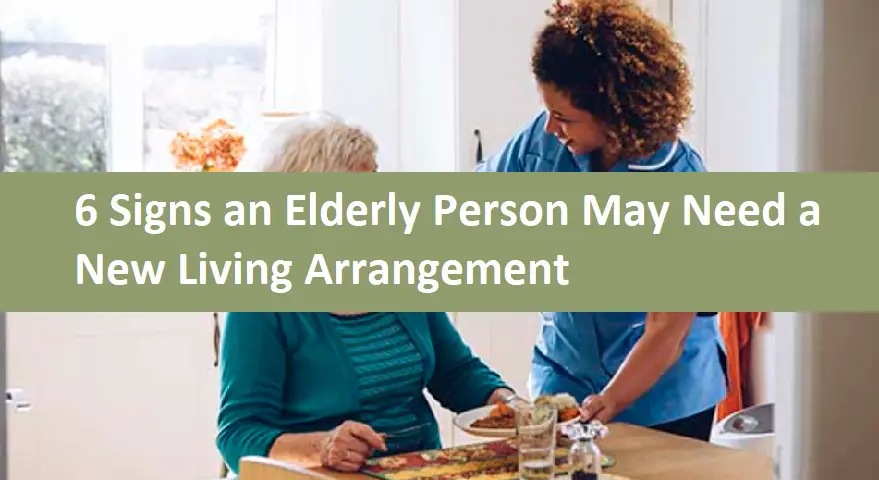As your elderly loved one ages, it can beco e more challenging for them to maintain their independence and stay safe on their own. If you’re caring for an elderly parent or relative, it’s essential to look out for signs that they may need a new living arrangement. Here are six signs to watch for:
1. Increased Isolation and Loneliness
As seniors age, their social circle may shrink due to retirement, friends moving away, or the passing of loved ones. If you notice that your loved one is spending more time alone and appears lonely, it may be a sign that they could benefit from a new living arrangement where they can have more social interaction and support.
2. Difficulty with Activities of Daily Living
Seniors may struggle with everyday tasks such as bathing, dressing, or cooking as they age. If your loved one is having difficulty with these tasks, it may be time to consider a new living arrangement where they can receive the necessary support and assistance.
3. Decline in Personal Hygiene and Grooming
If you notice that your loved one is no longer taking care of their personal hygiene and grooming needs, it may be a sign that they are struggling to manage these tasks on their own. A new living arrangement where they can receive assistance with personal care may be the best option.
4. Decline in Housekeeping and Home Maintenance
Keeping up with household tasks such as cleaning, laundry, and yard work can become increasingly challenging as seniors age. If you notice that your loved one’s home is becoming cluttered, dirty, or unsafe, it may be a sign that a new living arrangement where these tasks are taken care of could be beneficial.
5. Increased Forgetfulness and Confusion
Memory loss and confusion are common among seniors, but they can be signs of a more serious condition such as dementia. If you notice that your loved one is forgetting important tasks, getting lost in familiar places, or showing other signs of confusion, it may be time to explore a new living arrangement where they can receive specialized care and support.
6. Increased Falls or Accidents in the Home
Falls and accidents can be a sign that your loved one is no longer safe living on their own. If you notice that your loved one has had multiple falls or accidents recently, it may be time to consider a new living arrangement where they can receive assistance with mobility and safety.
FAQs:
As you navigate caring for an elderly loved one, you may have many questions about their care and well-being. Here are answers to some common questions:
1. Do many seniors live alone?
Yes, many seniors do live alone. According to the U.S. Census Bureau, nearly 30% of adults over 65 live alone. While living alone can be a sign of independence and self-sufficiency, it can also increase the risk of social isolation and loneliness.
2. Can seniors with dementia live alone?
Seniors with dementia may be able to live alone in the early stages of the disease, but as it progresses, they will likely require more support and supervision. It’s essential to work closely with your loved one’s healthcare provider to determine the best living arrangement for their needs.
3. Can you put someone into a nursing home against their will?
No, you cannot force someone into a nursing home. The only legal way to do so would be to obtain guardianship over them first. This requires going through a legal process, filing a petition with the court, and providing evidence that your loved one is incapable of making decisions for themselves or is a danger to themselves or others.
4. Can family members be held liable for allowing an elderly parent to live alone?
In general, family members are not usually held responsible for allowing their elderly parents to live alone. However, if a family member is legally or directly responsible for the senior’s care and well-being and fails to offer necessary assistance or care, they could be held liable for neglect or abuse. This is particularly true when the elderly person cannot make sound decisions or take care of themselves due to physical or cognitive limitations.
If you’re caring for an elderly loved one and are unsure about their living arrangement, it’s essential to work closely with their healthcare provider and other professionals to determine the best course of action. It’s also important to have open and honest conversations with your loved one about their needs and preferences to ensure that their wishes are respected.
When an Elderly Parent Refuses to Relocate
Even if you notice signs that your elderly loved one may need a new living arrangement, they may refuse to move. This can be challenging, especially if you’re concerned about their safety and well-being.
If your loved one refuses to relocate, it’s essential to have open and honest conversations about their care needs and preferences. Here are some tips for approaching the conversation:
- Listen to your loved one’s concerns and fears.
- Empathize with their desire to maintain their independence.
- Present options that can help them maintain their independence while also ensuring their safety.
- Involve your loved one in the decision-making process.
By approaching the conversation with empathy and respect, you may be able to help your loved one feel more comfortable with the idea of a new living arrangement.
Conclusion
Caring for an elderly parent or relative can be challenging, but by watching for signs and having open and honest conversations about their care needs and preferences, you can help ensure their safety and well-being. Just remember to approach the conversation with empathy and respect and involve your loved one in the decision-making process.

Morgan Elfman is a compassionate writer, dedicated caregiver, and passionate advocate for senior well-being. Born and raised with a deep sense of empathy and a natural inclination towards service, Morgan has devoted her life to making a positive impact on the lives of seniors.
As a writer for www.choiceseniorlife.com, Morgan utilizes his skills to create insightful and informative content that addresses the unique needs and challenges faced by seniors and their families. Her articles not only provide valuable information on health, lifestyle, and care options but also strive to inspire and empower seniors to lead fulfilling lives.

